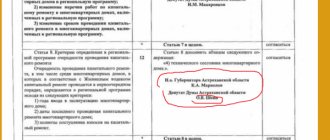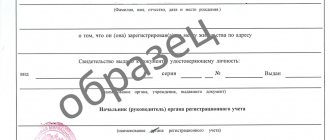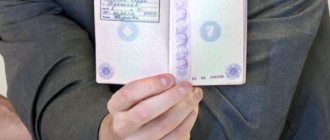New law on registration of citizens at place of residence and stay
- People in prison and serving their sentence can also register temporarily. They can apply for registration at the relevant institutions;
- the concept of “fictitious registration” was introduced, meaning illegal registration and registration based on inaccurate information;
- criminal penalties have been introduced for carrying out fictitious registration;
- administrative liability has been introduced for committing any offenses in the registration procedure;
- implementation of penalties applied to people without timely registration.
The duration of this procedure can last from a couple of weeks to several years - it all depends on the citizen. The registration law states that when the registration period expires, a person loses the opportunity to continue living in temporary housing, but the period can be extended in the future.
Legislation of the Russian Federation 2021
For the current year, the Law establishes the concept of “residence”. It can be a country house or apartment, which the citizen owns as an owner.
It can also be municipal housing, which is officially owned by the state. Staying in such a place is legally permissible.
A place for temporary stay is established, which can be a housing facility owned by a relative. It could also be a hotel or holiday home.
The following amendments were introduced to the Law:
| Temporary registration in correctional colonies | It is carried out for those persons who are in correctional institutions in connection with the execution of a sentence. |
| Fictitious registration | If the registration authorities establish it, the citizen will lose his registration. |
| Penalty for fictitious registration | Russians, stateless persons or foreign citizens are subject to criminal liability. |
| Administrative responsibility | Imposed if offenses are committed in this area. |
| Penalties | Introduced in relation to persons who do not register in a timely manner. |
According to current legislation, registration is considered fictitious if false documents were used or the person did not have the intention of living in the specified premises.
The same applies to situations where the owner of the property was not aware of the intention to provide it for residence. In fact, this condition is aimed at eradicating the situation when many non-residents are registered in one apartment.
Read whether registration of a child is required. On the registration of a newborn child at the mother’s place of residence. More details here.
Law of the Russian Federation of June 25, 1993
November 2, 2004, July 18, 2006, December 25, 2008, July 27, December 13, 2010, July 1, December 6, 2011, December 30, 2012, November 25, December 21, 28, 2013 December 22, 31, 2014, June 29, November 28, 2015, June 2, 2021, April 3, 2021, December 27, 2018, April 1, 2021
The definition of place of stay and place of residence is given. Registration of citizens is established at the place of stay and place of residence. For citizens of the Russian Federation, the obligation to register at the place of stay and place of residence remains, however, the lack of registration cannot serve as a basis for restricting the rights and freedoms of citizens.
Constant
Required when moving to a new apartment, when leaving your previous home, it is issued after contacting the same government agencies described above. The citizen registering must have a passport, as well as an apartment certificate or lease agreement, and a house register.
How long can you go without permanent registration?
No more than a week after moving.
To register, you need less than three days. The application can also be submitted online through the government services portal, but you will have to appear at a government agency at least to sign and stamp your passport. In case of registration of documents via the Internet, all marks are placed on the same day.
An extract from the previous address is no longer required, and the passport officer who prepares the documents carries out the procedure for registration and extract.
Thus, the federal law on registration at the place of residence imposes responsibility on every citizen of the Russian Federation, and when committing offenses, intentional or not, punishment is carried out, from a fine and administrative punishment to criminal. In addition, the registration procedure itself at the place of residence of citizens is not difficult.
How long can you live without registration and in what time frame do you need to register?
If a citizen intends to temporarily stay in a certain territory (stay), then the state allows not to register with the Federal Migration Service for up to 90 days. In this case, a temporary registration is issued, which should be applied for no later than 3 months. After this period of time, permanent registration must be carried out.
- Citizens of the Russian Federation - 7 days from the moment of moving to a new home (permanent registration), 90 days from the moment of the start of stay (temporary registration).
- Foreign citizens – 7 days from the date of receipt of a visa document or residence permit (permanent registration), 7 days (temporary registration).
- Newborns – 7 days after the issuance of a birth certificate or initial registration (permanent registration), 90 days (temporary registration).
What it is
The law establishes the rule regarding registration and de-registration.
Dear readers! The article talks about typical ways to resolve legal issues, but each case is individual. If you want to find out how to solve your particular problem , contact a consultant:
+7 (499) 938-81-90 (Moscow)
+7 (812) 467-32-77 (Saint Petersburg)
8 (800) 301-79-36 (Regions)
APPLICATIONS AND CALLS ARE ACCEPTED 24/7 and 7 days a week.
It's fast and FREE !
In accordance with Article 5 of the Law, the following requirements are established:
- There is a strictly established time for obtaining temporary registration - 90 days from the moment a person arrives in an apartment or house.
- If a citizen has a permanent residence permit in the same locality, he does not need to register his stay.
- You do not need to register in Moscow if you already have a residence permit in Moscow or the Moscow region.
- There is no need to register in St. Petersburg if you have permanent residence in the Leningrad region or St. Petersburg;
- There is no need to register in Sevastopol if you have a permanent residence permit in the Republic of Crimea or Sevastopol.
After transferring the documents, the procedure lasts no more than three working days at the new address.
If a person stays in a boarding house, sanatorium or correctional institution, registration is carried out by the relevant administration. In this case, the date of arrival and departure is indicated.
Thus, each person has not only the right, but also the obligation to register at their location. This makes it possible to contact medical institutions and provide your address for banking transactions.
Rules for registration and deregistration for citizens of the Russian Federation
“Citizens of the Russian Federation are required to register at their place of stay and place of residence within the Russian Federation. Registration or lack thereof cannot serve as a basis for restriction or a condition for the implementation of the rights and freedoms of citizens provided for by the Constitution of the Russian Federation, federal laws, constitutions (charters) and laws of the constituent entities of the Russian Federation.”
We recommend reading: The first medical donor point
For those who have permanent registration in another city of the Russian Federation, when registering for a new place of residence, the question often arises whether they need to be discharged in order to make a temporary registration. Permanent and temporary registration are not considered mutually exclusive procedures, therefore, if you change your place of residence, you do not need to check out of your old home. It is enough to go through the temporary registration procedure upon arrival in another city.
Registration of a minor child
The law separates the registration of children under 14 years of age from the registration of the place of residence of minors under 18 years of age. The difference is that a child after 14 years of age can independently choose his own place of residence and be present in person when paperwork is completed with the relevant authorities.
Children under 14 years of age are registered ONLY at the place of registration of one of their parents, but not other relatives, regardless of the degree of their relationship. Citizens over this age can register at a different address, but with the written permission of his legal representative.
General rules for registration at the place of stay or place of residence
It is not necessary to register from the address of the sold apartment - departure can be registered along with a new registration. The application is submitted to the same institutions as for temporary registration. The only difference is the completed form and the result of the procedure - permanent registration will be indicated by a stamp in the passport, and not a separate document.
According to the law, children under 18 must live with their parents. Accordingly, they receive registration at the address of their permanent residence, regardless of the established standards for the number of meters per resident. If a minor does not have parents, then registration is carried out with a trustee or guardian.
Rights of minors
The registration law protects the interests of minor children. Parents must register their child immediately after birth. The fine for non-compliance is 2500-3500 rubles.
A minor child under 14 years of age can only be registered with his parents. In the case where the father and mother are registered at different addresses, the consent of the second spouse is required when registering with one of them. If the parents are divorced and the child is under 14 years old, then the consent of the second spouse is required when registering the child.
From 14 to 18 years of age, a child who has a passport can independently write an application, which will be considered only from the point of view of parental consent/disagreement. Only upon reaching the age of majority (18 years old) can a child register at any address without obtaining parental consent.
Important! Children under 14 years of age do not participate in the registration procedure. One of the parents fills out the application form for them and provides a Birth Certificate. After 14 years of age, the child must be present with his parents. He fills out the application himself.
Registration and registration
- Application in Form-6.
- A document confirming the identity of the applicant (a passport is most often used, but the law allows the use of several documents, including an international passport and a temporary ID).
- House (or apartment) book.
- Document on ownership of the property (it is worth remembering that since 2016, a certificate of ownership has not been issued. The right can be confirmed using an extract from the Unified State Register).
- Consent of the owner of the premises (if registration is made at the address of real estate owned by a third party).
Registration is carried out by the administration of such institutions on the basis of documents that were provided for identification. They provide information to the FMS within 24 hours from the date of their placement on the territory. The transfer of information can be carried out using electronic means of communication. The only exceptions are places of deprivation of liberty, which notify the relevant authorities within seven days.
Latest updates
Previously, the legislation provided for mandatory registration of registration on a permanent basis for emigrating citizens. For 2021, such a need has disappeared and if you change your place of residence, it is enough to have temporary registration. At the same time, the registration procedure itself was made simplified and more accessible.
The bill on temporary registration was created for:
- combating migrants illegally living in the Russian Federation;
- control of Russian citizens living outside the registration bridge;
- identifying illegal rental housing.
The new law on temporary registration itself provides for tough measures in case of non-compliance. Thus, based on recent changes to the bill, if the law on migration is violated, citizens will face fines ranging from 1,500 to 5,000 rubles. If we talk about foreigners, in addition to sanctions, they face deportation.
The temporary accounting rules are as follows:
- Russian citizens, in the event of a change of permanent residence, undertake to register at the new address within seven working days;
- in case of temporary departure, which will last more than three months, it is necessary to register the place of residence within 30 days;
- Newly arrived citizens of other countries are obliged to notify the Federal Migration Service of their arrival and place of stay within a week.
In addition, according to the rules of the law on temporary registration, all citizens (foreign and Russian) can only work in the region where they were registered for migration.
Also, innovations in the law affected the concept of fictitious registration. For a long period, there were many gaps at this point, thanks to which people coming to the territory of the Russian Federation in order to earn money could work for a long time in various regions of the country without registering with the Federal Migration Service.
Now a registration is considered fictitious if the citizen does not actually live, which can be discovered during an audit.
In addition, there have been changes for foreign citizens regarding obtaining temporary registration in Moscow. Now, upon arriving in a given city, a citizen is obliged to notify the FMS of his stay within 120 days.
Registration of a child without the consent of the owner is possible in certain cases clearly specified in the current legislation.
A sample of notarial consent for permanent registration is provided at this link.
As for landlords of residential and non-residential premises, in order to avoid sanctions, they are obliged to register the tenant with the Federal Migration Service and draw up a rental agreement within the period established by law.
The legislation provides for the payment of taxes and the declaration of income from renting out an apartment.
Rules for registration and deregistration of citizens of the Russian Federation 2018
“A citizen who has changed his place of residence must, no later than 7 days from the date of arrival at his new place of residence, contact the officials responsible for registration and submit: an identification document; a document that, in accordance with the housing legislation of the Russian Federation, is the basis for moving into a residential premises. An application in the established form for registration at the place of residence in the form of an electronic document, as well as copies of the documents specified in this paragraph, in electronic form can be submitted through the Unified Portal. “
- Appear at your territorial FMS office (in common parlance – the passport office) and declare (in writing) your desire to deregister.
- Fill out the forms provided (departure sheet, statistical sheet), indicating the exact address of the new place of residence.
- Hand over your passport and completed documents to the FMS officer.
- Within the next three days (the official will announce the deadline), receive a passport with a stamped “extract”.
Liability and fines
Resolution N713 establishes that citizens of the country must register temporarily within the current period. 3 months If this deadline is violated, administrative sanctions in the form of a fine are applied. For citizens, the fine will be 2-3 thousand, for landlords - 2-5 thousand rubles. In the capital and St. Petersburg, the fine is slightly higher than in the regions: 3-5 thousand for citizens and 5-7 thousand for landlords.
For legal entities for persons renting out housing to a citizen without registration, the fines are much harsher and amount to several hundred thousand rubles. Thus, in the centers of the constituent entities of the Federation, a fine can be issued in the amount of 300 to 800 thousand.
Criminal or administrative punishment?
Article 19.15.1 of the Administrative Code determines that without registration you cannot live in Russia, either temporarily or permanently. According to the administrative regulations of the Federal Migration Service, registration at the place of residence is mandatory for everyone.
How long can you live without legal registration? To register at a place of temporary residence, a citizen has a period of 90 days after his arrival at the place of temporary residence and a period of 7 days after arrival at a new permanent place of residence.
If a violation is detected, sanctions may follow:
- a person living without registration can be fined 3 thousand rubles;
- the owner of the apartment in which a stranger lives - for 5 thousand;
- in Moscow and St. Petersburg, fines were increased by another 2 thousand rubles (to 5 and 7 thousand, respectively).
You are not fined under this article if:
- the person living in the apartment is registered in the same locality;
- living in Moscow is registered in the Moscow region;
- living in St. Petersburg is registered in the Leningrad region;
- residents are close relatives of the apartment owner (husband/wife, son/daughter, stepfather/stepmother, grandmother/grandfather, grandchildren).
Article 19.15.2 of the Code of Administrative Offenses contains the following sanctions:
- for violating the rules of registration in the owner’s apartment (including deadlines), a fine may be imposed on the resident - up to 3 thousand rubles, on the owner of the apartment - up to 5 thousand;
- in Moscow and St. Petersburg, the resident will be fined 5 thousand, and the owner of the home – 7 thousand rubles.
Sanctions under this article do not apply if:
- residents are close relatives of the apartment owner;
- the resident is registered in the same locality;
- living in Moscow (St. Petersburg) is registered in the Moscow (Leningrad) region.
Under Article 322.2 of the Criminal Code, you can get a criminal record for fictitious registration of a nonresident Russian or foreigner. Read more about whether a nonresident citizen needs registration and what is needed for this here.
Article 322.2. Fictitious registration of a citizen of the Russian Federation at the place of stay or at the place of residence in a residential premises in the Russian Federation and fictitious registration of a foreign citizen or stateless person at the place of residence in a residential premises in the Russian Federation
Fictitious registration of a citizen of the Russian Federation at the place of stay or at the place of residence in a residential premises in the Russian Federation, as well as fictitious registration of a foreign citizen or stateless person at the place of residence in a residential premises in the Russian Federation -
shall be punishable by a fine in the amount of one hundred thousand to five hundred thousand rubles, or in the amount of the wages or other income of the convicted person for a period of up to three years, or by forced labor for a period of up to three years with deprivation of the right to hold certain positions or engage in certain activities for a period of up to three years, or without it, or imprisonment for a term of up to three years with deprivation of the right to hold certain positions or engage in certain activities for a term of up to three years, or without it.
Note. A person who has committed a crime under this article is exempt from criminal liability if he contributed to the disclosure of this crime and if his actions do not contain another crime.
The punishment under this article is decent; the owner of an apartment who illegally registers a stranger (temporarily or permanently) faces:
- a fine of 100 thousand to half a million rubles (or in the amount of his three-year salary;
- forced labor for up to 3 years (with deprivation of the right to certain activities or a certain position);
- imprisonment for 3 years.
If the culprit reports the fictitious registration to the police, he will be released from the sanctions of the article.
Read here about how long you can live without registration and what will happen if you don’t meet the deadlines, and you will learn more about fines for late or lack of registration in this material.
In conclusion, advice: do not violate the registration law, so as not to fall under police pressure and not to fall under sanctions of the Administrative or Criminal Code.
Law on Registration and Discharge of Citizens of the Russian Federation
If the relative of the author of the question fails to register due to the lack of consent of the other residents of the communal apartment, he should first receive a written refusal to register, and then appeal this decision to the court.
As follows from the above provisions, the specified paragraph of the Rules contains an exhaustive list of documents required for registration of a citizen at the place of residence (formerly called registration). In the case under consideration, such documents will be, in addition to the passport of a citizen of the Russian Federation or other identification document, statements, and a contract for the sale and purchase of a share in property rights.
Registration formats mentioned
You can register temporarily only in the premises provided for by law regarding a non-permanent (short-term) place of residence. The list of such places can be found directly from the Federal Migration Service by going to their official website or by reading Art. 1, part 3 of the bill on temporary and permanent residence.
Non-residential premises
A frequent question regarding temporary registration is the possibility of obtaining registration in non-residential premises. And if earlier such cases of registration could slip through, today, after changes were made regarding fictitious registration, this has become impossible.
There are two concepts in the legislative framework regarding registration:
- at the place of stay;
- location.
We suggest you read: There is a foreign employee in the company. How to offset an advance for personal income tax?
So, the first includes: sanatoriums, rest homes, hospitals, hotels, campsites, boarding houses and residential premises where a person lives temporarily. The second includes residential premises in which a citizen has permanent registration and lives for a long time.
Temporary registration is carried out exclusively for residential premises, and to obtain it there is no need to be discharged from your permanent place of residence (Article 2, clause 2.1).
Apartments
What are apartments in Russia? So, if in European countries this word refers to residential premises that have more comfortable and expensive living conditions, then in our country an apartment means an expensive hotel room.
After making some changes to the registration law, every citizen who can financially afford to live in such an expensive premises can temporarily register in the apartments.
Also, according to the changes, the period for temporary registration itself has been extended. Now you can register in an apartment for a period of up to 5 years.
It is impossible to obtain permanent registration in an apartment even if it is purchased as private property. The only way to change the situation is to try to convert non-residential premises into residential ones or to achieve the right to permanent registration through the court.
Country cottage area
It has become possible in our country since 2008 to obtain temporary or permanent registration on a summer cottage plot that has a residential building.
To obtain such a document, the owner will need to convene a commission to inspect the house located on the territory of the dacha, which must comply with the following points:
- the presence of a foundation, during the construction of which all the standards for residential buildings were observed;
- availability of communications: heating, water supply, electricity, gas;
- thermal insulation must comply with standards;
- the design of the house complies with general technical requirements.
Also, the dacha premises must be checked by the state epidemiological, environmental and fire services.
To obtain permission to register on a dacha plot, you must take into account its location and if the dacha is located outside the populated area, then registration will be denied
What is the period given for registration after discharge?
All actions that are carried out to register a person have certain periods prescribed in the current legislation. Violation of them is punishable by a fine. A person is given 90 days to register. from the day of arrival at the new place and a week for moving.
Registration can be either permanent or temporary. If this is the last option, then the period is indicated on the certificate. When registering permanently, it is valid for an indefinite period. There is no fee for registering Russian citizens. If these are foreign citizens, then they must pay for this action.
Sample application
Each person must apply for registration in person. But it can be done with a power of attorney certified by a notary. The application is submitted in the area where the residential space is located.
The application is filled out in the form of Form No. 6. It contains clauses on entering important information about the applicant.
This is the following information:
- place of arrival;
- Personal Information;
- place of intended residence.
If we are talking about temporary registration, a specific period is indicated. Information about the person who is the owner of the property is also indicated.
A person needs to write an application on his own behalf with a request to register it. The basis for the procedure is also indicated. If we are talking about housing in which other persons live, their written consent is required.
When registering for permanent registration at a new address, the following data must be indicated:
- Full name and date of birth;
- the address at which the citizen was previously registered;
- information about the ownership of residential premises;
- passport details.
At the bottom of the application, the date, signature and its transcript are indicated. If the housing belongs to the applicant, family members, including minor children, can be included in the form.
If we are talking about an application for temporary registration, form No. 1 is used. This form must indicate the period of stay within the locality. A passport is submitted along with the application for identification.
How many days after discharge are citizens of the Russian Federation required to register?
Moreover, passport officers and FiMoSniks do not have the right to refuse to accept documents for registration and make the implementation of the registration procedure dependent on the payment of a fine, especially in accordance with an unlawful decision. Fight for your legitimate rights and interests and put the squalor lounging in government and housing office offices in its place.
How many days after discharge are citizens of the Russian Federation required to register? The fact is that we sold the apartment and, accordingly, checked out before the sale. Now we have moved to a new apartment and the whole family went to register at a new address, but the passport office told us that we had to register within seven days and are now required to pay a fine. Are the passport officers right, because only two weeks have passed since discharge?
Features of registration without the right to living space
Registration without the right to living space is needed in order to:
- get officially employed;
- obtain a mortgage or consumer loan;
- receive government subsidies, pensions and benefits;
- receive medical care in public hospitals and clinics;
- register the child in a state educational institution.
As a rule, a citizen can only obtain a temporary registration if he does not have the right to housing. This applies to cases where he rents an apartment for a short period. Homeowners are reluctant to allow a stranger to register on a permanent basis. The following nuances of registration without the right to living space should be taken into account:
- The owner has the right to register strangers in an apartment or house if they were purchased with his own funds or he carried out privatization.
- All registered residents do not claim ownership of housing.
- A person can be discharged without his or her wishes only by a court decision.
- A registered person has the right to register his minor children in this living space without the knowledge of the owner of the property. In the future, this may spell serious problems for the apartment owner, since it is much more difficult to legally evict children than adults.
It is to protect their interests that homeowners agree only to temporary registration and enter into an agreement that can be terminated by the owner at any time.











